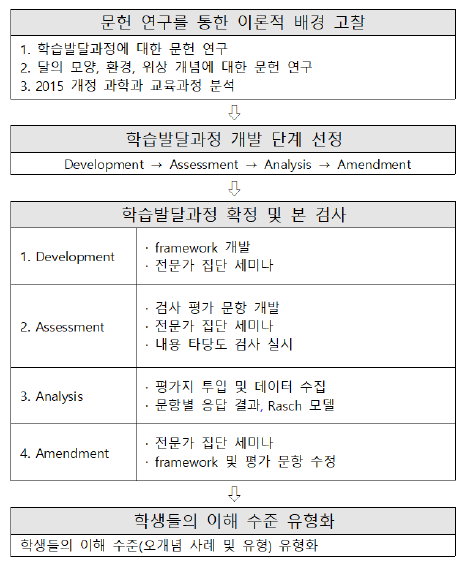Abstract
The purposes of this study are to develop learning progressions for the concept of the environment, and phase of the moon for elementary and secondary students based on the achievement standards and assessment standards of the 2015 revised science and education curriculum, and to verify the effectiveness of the learning progressions to ensure that it is suitable for the level of understanding of elementary and secondary students. The learning progressions were elaborated to determine the learning progressions for a total of 2,007 students, 961 elementary school students and 1,046 middle school students. The research process consisted of the following four stages: Development, and Assessment, Analysis, Amendment stage. Through the sequential and iterative process, the learning progressions were elaborated. In the Development stage, a framework for a hypothetical learning progressions were constructed by analyzing the achievement standards, assessment standards of the 2015 revised national science curriculum, and previous studies. In the Assessment stage, assessment questions including ordered multiple-choice items, optional and narrative questions that can confirm students' level of understanding were developed. Rubric was presented to assist in scoring questions with various responses. In the Analysis stage, data was collected and analyzed by putting assessment into elementary and secondary students. By analyzing the grade-level item response results and the Rasch model's Wright map, the items in the assessment questionnaire were checked and verified to reflect the students' level of understanding. In the Amendment stage, the learning progressions were corrected and supplemented by checking the MNSQ and Infit values, Outfit values, Ability values. As a result of analyzing the developed learning progressions, the learning progressions on the concepts of the environment, and phase of the moon reflected the 2015 revised national science curriculum and was completed through expert group seminars. The learning progressions developed through this study suggested how the level of understanding of students' concepts changed, and reflected the students' understanding. In addition, it was confirmed that the order and content system for the concepts of the shape, environment, and phase of the moon presented in the 2015 revised national science curriculum were constructed to reflect students' level of understanding. It is possible to use the assessment items in order to grasp the level of students' understanding and it will provide many implications for the integration of the curriculum-learning-assessment and the restructuring of the 2022 revised science and curriculum.
Figures & Tables

Fig. 1. Procedure of study


